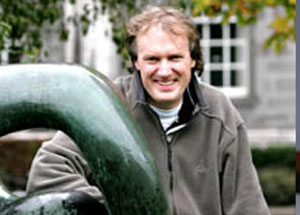Trinity College Dublin Scientists Make Vaccine Breakthrough
Posted on: 08 May 2009
Scientists at Trinity College Dublin have discovered a brand new protein in the immune system which if targeted has the potential of developing more effective vaccines. The research team, led by Professor of Biochemistry, Luke O’Neill of TCD’s School of Biochemistry and Immunology, have found a protein which they have named TAG. TAG limits a key process in the body that is needed for vaccines to work. “If we can now devise a way to interfere with TAG, we may be able to boost experimental vaccines for diseases such as HIV and malaria “, explained Professor O’Neill. The findings are published online in the world leading Immunology journal, Nature Immunology.
A key challenge in vaccine research is to get the immune system to respond appropriately to a vaccine. TAG limits the action of another protein called Tram. Tram is normally triggered during an immune response by vaccines which have components sensed by the immune protein called TLR4. “Tram is pivotal to vaccine research. It has been shown by scientists to be necessary for vaccines to work. Subsequently, the discovery of a Tram blocker such as TAG is also very significant”, said Professor O’Neill. “In effect, Tram is the accelerator for vaccines with TAG acting as the brake. If TAG is targeted in a manner akin to lifting the foot from the brake on the immune response, it could lead to better vaccines for diseases where there is a compelling need. “
Lead scientists included Dr Eva Palsson McDermott, Dr Sarah Doyle and Dr Anne McGettrick of Trinity College Dublin and involved a collaboration with the Universities of Massachussets and Trondheim. The research was funded by Science Foundation Ireland (SFI).
“The discovery of TAG would not have been possible without the funding from SFI, and it is an excellent example of how basic research is needed to improve the prospects of developing the biotechnology sector in Ireland,” said Professor O’Neill, who is also a co-founder and Director of Opsona Therapeutics, a Trinity College campus biotechnology company focused on novel therapeutic and preventative approaches to autoimmune and inflammatory diseases.

Professor Luke O’Neill
Notes to Editors:
The full title of the paper appearing in Nature Immunology is: ‘TAG, a splice variant of the adaptor TRAM, negatively regulates the adaptor MyD88 independent TLR4 pathway’ The full listing of authors and their affiliations for this paper is as follows:
Eva M Palsson-McDermott1,5, Sarah L Doyle1,5, Anne F McGettrick1,5, Matthew Hardy2, Harald Husebye3, Kathy Banahan1, Mei Gong4, Douglas Golenbock4, Terje Espevik3 & Luke A J O’Neill1
1 School of Biochemistry and Immunology, Trinity College Dublin, Ireland.
2 CSL, Parkville, Victoria, Australia.
3 Norwegian University of Science and Technology, Institute of Cancer Research and Molecular Medicine, Trondheim, Norway.
4 University of Massachusetts Medical School, Worcester, Massachusetts, USA.
5 These authors contributed equally to this work.
Professor Luke O’Neill is one of the curators of the INFECTIOUS exhibition at the Science Gallery, at Trinity College Dublin. ‘Infectious’ explores methods of contagion and measures of containment through a range of unique interactive experiences and experiments, including the world’s first live epidemic simulations.
